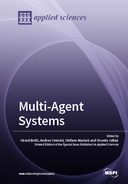Explore

Multi-Agent Systems
0 Ungluers have
Faved this Work
Login to Fave
This Special Issue ""Multi-Agent Systems"" gathers original research articles reporting results on the steadily growing area of agent-oriented computing and multi-agent systems technologies. After more than 20 years of academic research on multi-agent systems (MASs), in fact, agent-oriented models and technologies have been promoted as the most suitable candidates for the design and development of distributed and intelligent applications in complex and dynamic environments. With respect to both their quality and range, the papers in this Special Issue already represent a meaningful sample of the most recent advancements in the field of agent-oriented models and technologies. In particular, the 17 contributions cover agent-based modeling and simulation, situated multi-agent systems, socio-technical multi-agent systems, and semantic technologies applied to multi-agent systems. In fact, it is surprising to witness how such a limited portion of MAS research already highlights the most relevant usage of agent-based models and technologies, as well as their most appreciated characteristics. We are thus confident that the readers of Applied Sciences will be able to appreciate the growing role that MASs will play in the design and development of the next generation of complex intelligent systems. This Special Issue has been converted into a yearly series, for which a new call for papers is already available at the Applied Sciences journal’s website: https://www.mdpi.com/journal/applsci/special_issues/Multi-Agent_Systems_2019.
This book is included in DOAB.
Why read this book? Have your say.
You must be logged in to comment.
Rights Information
Are you the author or publisher of this work? If so, you can claim it as yours by registering as an Unglue.it rights holder.Downloads
This work has been downloaded 511 times via unglue.it ebook links.
- 238 - pdf (CC BY-NC-ND) at Unglue.it.
Keywords
- 3D representation
- agent behavior
- agent development framework
- agent development methodology
- agent methodologies
- agent technology
- Agent-based modeling
- Agent-Based Modelling
- agent-based programming
- agent-based simulation
- agent-based social simulation
- agent-oriented software engineering
- agent-oriented technologies
- agreement technologies
- Ambient intelligence
- artificial intelligence
- autonomous agents
- BDI agents
- behavior modeling
- Behavior Trees (BTs)
- bike sharing systems (BSS)
- carpooling
- charging stations
- cognitive disabilities
- collision avoidance
- commuting
- complex network
- computational accountability
- Computer science
- coordinated control
- Coordination
- coordination models
- Data visualization
- Delay
- directed graph
- Electric vehicles
- electronic bartering system
- formation tracking
- genetic algorithm
- Genetic Programming (GP)
- human-machine interaction
- intelligent agents
- intelligent hybrid systems
- kinodynamic planning
- linked data
- Mechanism Design
- methodologies for agent-based systems
- mobile communication
- mobile device agent
- Mobile Robot Navigation
- Model-Driven Development
- multi agent systems
- multi-agent simulation
- multi-agent system
- multi-agent systems
- Multiagent systems
- multiple passive agents
- network management
- online double auction
- Ontology
- open data
- organizational model
- organizations and institutions
- Orientation
- pedestrian environment
- perishable goods
- person tracking
- RBFNNs
- regression models
- scaled consensus
- SEA_ML
- Semantic Web
- semantic web service
- Smart cities
- social commitments
- socio-technical systems
- sociogram
- socio–technical systems
- surface vehicle
- trajectory mining
- travel behavior
- tree mining
- type-2 fuzzy inference system
- underactuated vehicle
- user interaction levels
- velocity obstacle
- [-5]agent-based simulation
Links
DOI: 10.3390/books978-3-03897-925-8Editions


